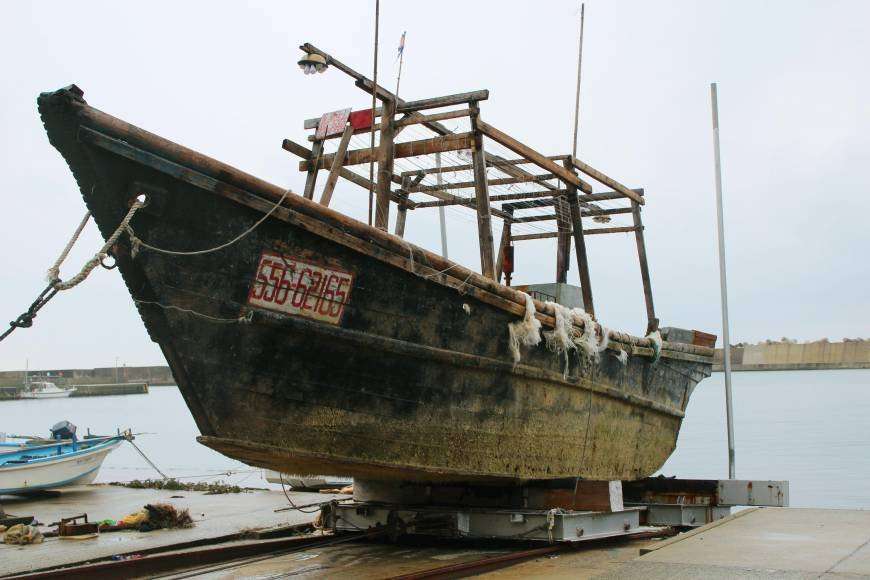They drift into seas near Japan by the dozens every year, ghostly wrecked ships thought to come from impoverished North Korea.
Japanese authorities said Tuesday they are investigating nearly a dozen wooden boats that were found off the northwestern coast over the past month and carried decomposing bodies.
In most cases, the bodies are in such bad shape after being at sea for weeks that it has been impossible to determine their cause of death, officials say.
On Nov. 20, officials found 10 bodies in three boats off the coast of Ishikawa Prefecture. Two days later, another wooden boat was found off nearby Fukui Prefecture with six skulls, one nearly intact body with a head, and various other bones and remains, Japan Coast Guard official Yuka Amao said.
Coast guard officials said at least 11 shoddy fishing boats carrying the bodies have arrived since late October. Most are carrying equipment, nets and signs written in Korean, including one carrying a sign saying “Korean People’s Army,” the North Korean army.
The poor condition and small size of the 10- to 12-meter-long vessels are not typical of South Korea or Japan, said coast guard spokesman Yoshiaki Hiroto. He said evidence suggests the boats are from the Korean Peninsula, though he declined to identify the country.
The recent spate of arrivals has drawn attention, though such discoveries are not out of the ordinary; dozens of such wrecked boats drift toward Japan every year.
So far this year, 34 mystery boats have drifted over, including the 11 found between late October and November. Last year, Japan found 65 of them. In 2013, there were 80, according to the coast guard.
The number tends to rise during the fall and winter because of prevailing winds from the northwest, Hiroto said.
Defectors and experts say fishing boats under the command of the Korean People’s Army may have succumbed under pressure from leader Kim Jong Un to catch more fish, drifting off course and ill-equipped for rough seas.
TV images of some of the boats showed relatively large but otherwise primitive-looking motorized craft. The coast guard said they did not have GPS navigation systems. Those aboard could have died of starvation and exposure to the cold after getting lost.
Although the Meteorological Agency said there was not unusually bad weather in the Sea of Japan this November, the waters are rougher at this time of year due to the onset of cold northwesterly winds.
October through February is prime season for squid, sandfish and king crab off the east coast of the Korean Peninsula, and it is not unusual for there to be high numbers of boats at sea, said Kim Do-hoon, a professor of fisheries science at Bukyong National University in Busan, South Korea.
“Kim Jong Un has been promoting the fisheries, which could explain why there are more fishing boats going out,” he said. “But North Korean boats perform really poorly, with bad engines, risking lives to go far to catch more. Sometimes they drift, and fishermen starve to death.”
Over the years, North Korean boats seeking the rich fishing grounds of the Sea of Japan have washed ashore in Japan as well as on the deserted beaches of the Russian Far East.
North Koreans looking to defect, on the other hand, typically flee by land into China or, less often, via coastal waters to South Korea.
Fishing is a vital industry in a country where millions cannot find enough to eat. North Korea’s 1.2-million-strong army is heavily engaged in food production, including fishing.
“Some of the boats belong to Korean People’s Army (KPA) fishery stations, possibly operating to catch sailfin sandfish,” said An Chan-il, who served in the North’s army as a junior officer before defecting to South Korea in 1979 and now heads a private think tank on North Korea in Seoul. “Kim Jong Un is pushing hard to produce more fish. So these boats must have been stranded after overworking.”
The North Korea’s young leader has made boosting food production a priority for the isolated country since taking office after his father died in late 2011. He recently visited a KPA fishing station on the east coast, calling for it to be upgraded, the official KCNA news agency said.
The Nov. 25 report said, “Modernization of the station will help it catch more fish, [Kim] said, adding: The station should be turned into an up-to-date fishery base which can be boasted of in the world, thus making our ongoing efforts produce good results for the service persons and civilians.”
Lee So-yeon, an army defector who arrived in Seoul in 2008, said fish products are a key export for North Korea’s army, which hires civilian fishermen to make money.
“Army units and security agencies are running many businesses to earn foreign currency, from mining gold to catching fish on the west and east coasts,” said Lee.
Lee Jong-won, professor of international relations at Waseda University in Tokyo, added: “The North is introducing an incentive system for producers. Fish is one of the main export products to China, which can be a way to get foreign currency. There is a possibility this incentive system led people to take more risks.”

coffeeandtea93 on May 2nd, 2017 at 07:10 UTC »
I lived in Ishikawa when this was happening. Some people said the boats had beheaded corpses on them. Whatever the reason, it was really spooky to go to the beach and know what was across the water.
AP10001110101 on May 2nd, 2017 at 06:39 UTC »
I wonder is NK calls it the Sea of Japan, or if they have their own name for it. I imagine NK wouldn't like their entire East coast named after a country they hate so much.
malvoliosf on May 2nd, 2017 at 02:15 UTC »
So the boats are from the Korean Peninsula, but not from South Korea. What country could they be from? It's a mystery. I guess we'll never know.